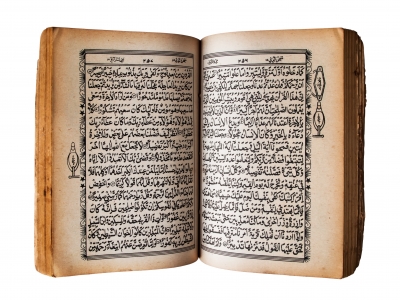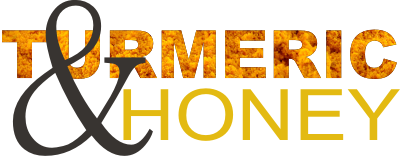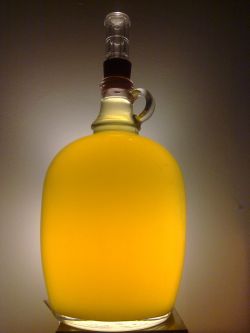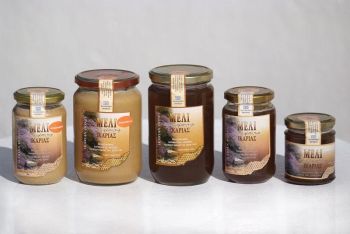Muslims respect bees for their intelligence, industry and creativity. In the Koran there is an entire chapter, entitled “The Bee”, which states (16:67 – 16:69):
“And of the fruits of the palms and the grapes – you obtain from them intoxication and goodly provision; most surely there is a sign in this for a people who ponder. And your Lord revealed to the bee saying: Make hives in the mountains and in the trees and in what they build. Then eat of all the fruits and walk in the ways of your Lord submissively. There comes forth from within it a beverage of many colors, in which there is healing for men; most surely there is a sign in this for a people who reflect.”
In The Musical Origin of the Symbols of Animals, Dr. Marius Schneider refers to a drink called ‘The Koran’, which is ‘spiritually’ considered to be a sacred honey based beverage. Additionally, the prophet Muhammad, who lived in Mecca and Medina in 570-632 AD, mentioned Bees and honey in the Koran in Sura 16.68, including the phrase “and thy Lord inspired the Bee.” And according to Muslim tradition, god revealed himself to the Bees. It is also interesting to note that the prophet Muhammad lived in Mecca, where a sacred stone from heaven is worshiped to this day – as it was in Delphi, where Bee Priestesses were consulted as seers.
Before eating honey, the Arabs say: “Bism Allah” (in the name of Allah) or “Allah Akbar” (Allah the greatest).
The Arabic name of the bee is nahlat, which means a gift of Allah, and han means honey. Apparently it was the root of the German “honig” and English “honey.” Arabia was the last stepping stone before honey invaded Europe from the East.
Honey is medicine
According to the Arabic writer Ibn Magih , the prophet Mohammed said:
“Honey is a remedy for every illness of the body, and Koran is a remedy for all illnesses of the mind, therefore I recommend to you both remedies: the Koran and honey”.
According to a Mohammedan legend, young “Abraham”, (who lived about 2000 B.C.) spent fifteen months in a cave. On Allah’s order, he obtained water from his thumb, milk from his index finger, honey from the middle one, date juice from the fourth, and butter from his little finger.
Hilda Ransome in her book “The secret bee” reproduces the story of Al Beidawi about the prophet Mohammed recommending honey as medicine:
” A man once went to Mohammed, and told him that his brother was afflicted with violent pains in his stomach, and diarrhea. The prophet told him to give his brother honey. He heeded the prophet’s advice, but soon returned and reported to Mohammed that the medicine had not done his brother any good. Mohammed exclaimed: “Go and give him more honey, for God speaks true, and thy brother’s belly lies.” The dose being repeated, the man, by God’s mercy, and the salutary effect of honey, was completely cured.”
In The history of beekeeping and huney hunting, Eva Crane included a translation of a passage of the physician Ibn el-Beithar, who wrote about honey in his book about herbal medicine, which he wrote near the end of the twelfth century:
“Honey dispels humour (body fluids), relaxes the bowels, is helpful in treating dropsy, preserves flesh and prevents putrefaction, stimulates the appetite, is good against facial tic. Mixed with sesame oil and boiled wine it is used as an emetic when poison has been swallowed. It is the best treatment for gums and for teeth, which it also whitens, it gives good results with tonsillitis; it stimulates coitus, taken with water it cleanses intestinal ulcers and enhances the effect of medication.”
The same Ibn el-Beithar added that heated honey is useful for treating stomach chills swelling of the intestines, and stomach disorders due to problems of the pituitary gland.
Earl Muslims physicians fed honey to their patients as a laxative and also used it to improve blood circulation and to relieve stomach pain. Honey was also fed to children to prevent scurvy and rickets.
The Koran says many times that the technical skill of the bees is in producing sweet honey from the bitter juices of plants. Mohammed maintained that medicines administered by physicians are bitter, but those given by God are as sweet as honey. While some modern sayings suggest that the more bitter the medicine the better the doctor!
Honey is a talisman of good luck
Honey was considered to be an exquisite food and an important healing substance but the Prophet recommended eating honey also because it brought good luck. The followers of Islam looked upon honey as a talisman. The Mohammedans, to whom alcoholic fermented drinks were prohibited, drank their water with honey, which habit still prevails among the African Mohammedan negroes.
Honey is the food of Paradise
Ismael Abulfeda, relates how Mohammed, on the day after his wedding to Safiya Hoya, a Jewess of Aaron’s tribe, celebrated the occasion with a luxurious meal. Among the main delicacies, he mentions honey, dates and cream. When Mohammed reached the seventh heaven he found Christ, who ordered Archangel Gabriel to offer Mohammed a cup filled with honey. The Mohammedan conception of Paradise was “rivers flowing with honey.”
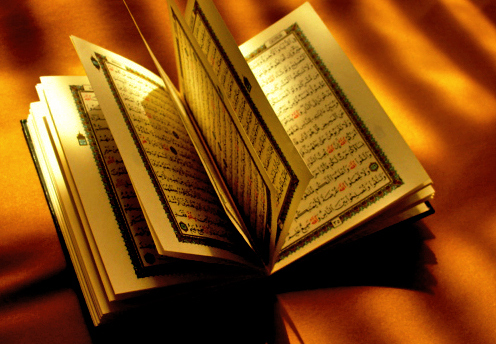
Related articles:
Honey in the Bible
Honey in history. Prehistory, Ancient Egypt, Ancient China.
Honey in history: Ancient India
Honey in history: Ancient Greece
Picture sources:
– “Opened Koran” credit nuttakit via free digital photos;
– “Opened Qur’an” by Flickr.com user “el7bara” – http://www.flickr.com/photos/el7bara/45540389/. Licensed under CC BY 2.0 via Wikimedia Commons ;
References:
– Nathaniel Altman: The Honey Prescription: The Amazing Power of Honey as Medicine;
– Eva Crane the “The world hystory of beekeeping and huney hunting”;
– http://www.honey-health.com/medicinal-value-of-honey/;
– http://andrewgough.co.uk/articles_bee2/

